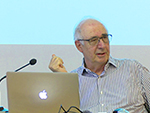In our approach to plurilingualism and language learning, i.e. the construction of plurilingualism, the accent will be placed on language use (languaging) instead of on language, based on the premise that competences emerge from interaction.
In groups living and working in more and more polyglossic context, people constitute diversified, plurilingual repertoires not in the sense that single languages or varieties are added one to each other; instead, they are integrated in a multicompetence where the borders between the varieties are often fluctuant.
Plurilingual repertoires are mobilized for practical needs in various modes depending on the context of use. One may particularly distinguish a monolingual mode on the one hand, where norms and/or the interlocutors’ repertoires suggest to the plurilingual speaker to “simulate” as far as possible a monolingual’s behaviour and deactivate his or her other varieties, and on the other hand a plurilingual mode, where many or all varieties are activated simultaneously. This leads to a number of forms of plurilingual speech or plurilanguaging.
Georges Lüdi is professor emeritus at Basel University
Autor: Servei d'Audiovisuals. Facultat de Ciències de l'Educació
Expedient: 81.105
Data:2017-05-19 10:53
Publicació: 05/19/2017
Durada: 53 min

